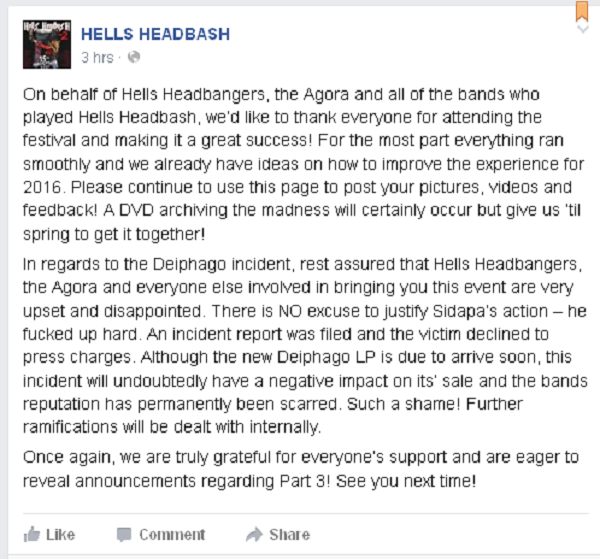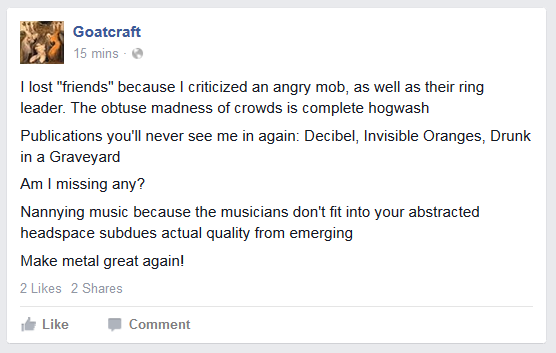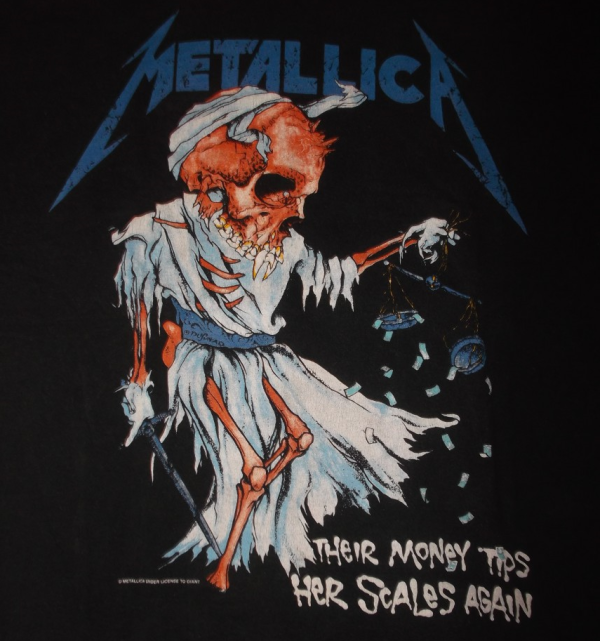
On the heels of the recent kerfuffle involving Deiphago and SJWs hyping an incident into a politically-driven media event, Hells Headbangers Records has released a statement about the incident. It reads, in part:
In regards to the Deiphago incident, rest assured that Hells Headbangers, the Agora and everyone else involved in bringing you this event are very upset and disappointed. There is NO excuse to justify Sidapa’s action – he fucked up hard. An incident report was filed and the victim declined to press charges. Although the new Deiphago LP is due to arrive soon, this incident will undoubtedly have a negative impact on its’ sale and the bands reputation has permanently been scarred. Such a shame! Further ramifications will be dealt with internally.
Although the label was just trying to do what it thought was the right thing, this statement reveals the core of SJW: it is driven by commerce and designed to signal safety. Just like big corporations spend millions to show that their cars, vacuum cleaners and toxic foods are safe, metal bands, labels and media are trying to expand their reach beyond the “scary” realm of the underground by making it “safe.” This was the same thing that selling out did in the 1980s, which was to take all those dangerous violent heavy metal bands and channel them into glam metal, which was offensive but not dangerous. There was nothing there that would sidetrack your child from going to school, getting good grades and going on to a career. Sure, he might have a bit more sex, and the bands took tons of drugs, but there were no ideas there that fundamentally challenged the bourgeois view of the world.
In the 1990s, death metal and black metal were far from safe as well. They rejected the dominant ideology of their time, committed actual crimes and more importantly, embraced political and philosophical viewpoints that are incompatible with democratic society and bourgeois existence. Forget the petit rebels of hip-hop and heavy metal, black metal bands actually scared people, and by doing so they upped the ante for what a band had to do to actually rebel. In many ways all heavy music has been stagnant since that time because no one can figure out how to be more extreme, and so they sigh and content themselves with being merely outrageous. “Selling out” meant that process where a band stops trying to have authenticity in its music and outlook on the world, and instead settles for whatever brings in a consistent audience.
In our current time, SJW is the method of selling out. If you go SJW, you will offend no one. People feel comfortable around businesses who promise that they are motivated by ideology, not profit. This also seems to guarantee that everyone will be accepted. Of course it does none of those things, being like all public relations exercises a series of cheap promises whose compliance can never be verified, but people like to be told comforting things. It calms them down and then they feel complacently optimistic when shopping at that store. This is why companies — again with shades of SJW — will fire controversial employees, hire private security, put up spikes to drive away the homeless and put up happy signs talking about diversity and how the uranium they use to flavor their food is 100% organic. Safety sells, or rather, lack of safety precludes sales.
Just like glam metal in the 1980s was preferred to hardcore punk, thrash and early death metal by parents who were afraid it was unsafe for their precious snowflakes to hear, and might lead them to a life lived in a van down by the river, precious snowflakes now want to be safe in their music. They want to be rebels… well, no they don’t. They want to appear to be rebels and at the same time, incur as little actual risk as possible. That way they can talk it up at the water cooler at work about how wild they are, and still not have to pay the price for wildness, like endangering their easy transition into the middle classes. It is not surprising that as metal has sold out in the 2010s with SJW, quality has plummeted. Who can make good music about such insincere topics?

Luckily a backlash has commenced. Using the tag line “Make Metal Great Again,” a small group of metal musicians have declared their intent to drive out SJWs by indirect methods, namely by demanding higher quality metal. Sell-out metal is poseur metal, which means that it is both fake and replaces real metal. Metal thrives when it replaces the fake with the real. That could in fact be metal’s mission statement. Poseur metal is fake because it is designed to signal “safety” instead of opening the can of worms of truth, realism, history, violence, disease, horror and existential doubt. Labels love poseur metal because it has high margins: cheap, without risk, and easy to clone, it returns on investment every time even if less than an out of the ballpark hit like a really great band can be. Magazines love poseur metal because they can re-type the same story every month. Web sites love it because no review is ever wrong when all the music is the same under the skin.
If you wonder why metalgate has hit such a nerve, it is that it has threatened the profit model of the entire industry. Metal ca. 2015 depends on a constant flow of mediocre poseur metal bands to make sure that all the journalists, label people, PR people, bands and studios get paid. The market has shifted from the smaller, more agile environment it was in the middle 1990s. Now metal is big business, and like Microsoft or Apple, it’s in middle age. It aims for conservative successes that do not alter the formula and will not take the risk on anything outside of the norm. Since the music is crap, the labels need some other way to sell it to people, and they came up with “safe rebellion”: it looks all leather and motorcycles, but in fact it is a PC nanny who will tell you that everything is fine so long as you keep buying SJW products and ignoring the obvious signs of impending social collapse.
There’s a lot of pushback out there against those who push against boundaries. This is to be expected, but you can tell who are the cowards in the room by the people who won’t call it what it is. It is resistance by those who are growing fat and lazy off of the easy money chain formed by mediocre metal. It is no wonder they get nasty. This is why David Ingram has a temper tantrum when other people commit the grave sin of failing to agree with him. It’s also why Viranesir, the band banned from BandCamp, found itself on the receiving end of quite a bit of vitriol:

In theory, SJWs and the like would be above such behavior. But that is the key to understanding them: their political opinions are advertising, not something they actually believe, just like what businesses say in television commercials are things designed to make you buy the product, not truths. The advertisements lie and SJW is an advertisement. This is why SJWs are so hell-bent on controlling what others see, hear and think. It would be a corporate wet-dream to have mind control, but with SJWs, they have a type of advertising that simply takes over like a virus or plague. Is is to surprising that many SJWs have connections to racist and fascist groups? As authoritarians, they appear to have switched sides, but really what they have done is changed their justification from ideology to commerce, and are now getting paid to advertise for their new corporate masters.
7 CommentsTags: false metal, gamergate, metalgate, poseur metal, poseurs, profit motive, sell-out, selling out, sjws






 1.
1.  Vital musical forms rely on creativity, spontaneity and message over matter. It is the curse of the artist that often the best of their work is at the behest of youthful lunacy and drunken madness, the early recordings where they grasp at the straws of vision without quite having formulated the techniques for achieving them – so they improvise and as Nietzsche would say, “
Vital musical forms rely on creativity, spontaneity and message over matter. It is the curse of the artist that often the best of their work is at the behest of youthful lunacy and drunken madness, the early recordings where they grasp at the straws of vision without quite having formulated the techniques for achieving them – so they improvise and as Nietzsche would say, “ Coming off the back of the raging, deathly,
Coming off the back of the raging, deathly,  A controversial pick, Metallica’s excellent third album fulfills the incorporation of progressive themes but seems to crystallize them to such an extent that no more creative spark would emanate from their later works. Cliff Burton’s presence in the unit, and his bridging of neo-classicist influences into their progressive speed metal was a defining feature of what many hessians and metallers saw to be the main component of their excellence. Having let this seep in on ‘
A controversial pick, Metallica’s excellent third album fulfills the incorporation of progressive themes but seems to crystallize them to such an extent that no more creative spark would emanate from their later works. Cliff Burton’s presence in the unit, and his bridging of neo-classicist influences into their progressive speed metal was a defining feature of what many hessians and metallers saw to be the main component of their excellence. Having let this seep in on ‘ While the speed and thrash metal boom was crumbling all around in the wake of Seattle and LA-based clothing styles storming the nation, a few European stalwarts lingered on the fringes and while some of them didn’t dare to take up the arms for intricate, narrative death metal, they were influenced by its vicious aggression and psychedelic subject matter. Coroner from Zürich, around
While the speed and thrash metal boom was crumbling all around in the wake of Seattle and LA-based clothing styles storming the nation, a few European stalwarts lingered on the fringes and while some of them didn’t dare to take up the arms for intricate, narrative death metal, they were influenced by its vicious aggression and psychedelic subject matter. Coroner from Zürich, around  Among the most ancient, recognisable and influential cults in Death Metal’s history, Morbid Angel’s tale of decline is a prolonged one, and raised continuous questions about the band’s creative state, as though their instruments were being channelled purely at the whim of the Outer Gods. The Floridan giants finally resisted the unearthly impulses that once guided them to create powerful statements of occult awareness bound up with a Nietzschean sense of overcoming and will-to-power, such that with the releases of ‘Gateways of Annihilation’ and ‘Heretic’, the band fell victim to triviality. Incremental lapses in quality can be traced back to much earlier albums however, with the departure of guitarist
Among the most ancient, recognisable and influential cults in Death Metal’s history, Morbid Angel’s tale of decline is a prolonged one, and raised continuous questions about the band’s creative state, as though their instruments were being channelled purely at the whim of the Outer Gods. The Floridan giants finally resisted the unearthly impulses that once guided them to create powerful statements of occult awareness bound up with a Nietzschean sense of overcoming and will-to-power, such that with the releases of ‘Gateways of Annihilation’ and ‘Heretic’, the band fell victim to triviality. Incremental lapses in quality can be traced back to much earlier albums however, with the departure of guitarist 
